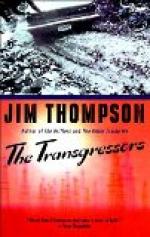During his enforced wait, Trueman improves the time by telegraphing to New York. He gets from Benson the latest details of the news; the full import of the terrible atonement dawns upon him. The Committee of Forty had come to the conclusion that it must meet force with force. This was a step which Trueman would never have sanctioned. He realizes that the opprobrium for the act of the committee will be placed on him. He has been associated with the committee; has been the one candidate which it indorsed. And for all that he has known absolutely nothing of its intention to carry out a wholesale annihilation.
“Who will believe that I am not an accomplice?” he asks himself.
“I have but one way to clear my name of such an imputation. I must stand out as the advocate for rational action. I must bring the people, those who know me and who will obey my wishes, to unite to suppress anarchy.”
As this thought shapes itself, the words on the card of one of the committee obtrude themselves on Trueman: “When anarchy seems imminent, take courage, for an honest leader will deliver you from harm.” Is there something prophetic in these words?
Reinforcements are arriving on trains that are obliged to stop in the rear of the express. One of the new arrivals is a part of the infamous Coal and Iron Police. As these men are familiar with the mining district, the Sheriff of Luzerne requests that they be placed on the Keystone and rushed through first. This request is complied with. When the train starts, after the track is cleared, the three hundred and fifty members of the Coal and Iron Police have exchanged places with the militia.
From the intemperate speech of the men, Trueman foresees that the conflict between the miners and the police will be sanguinary. He resolves to keep the two bodies of men apart, if anything in his power can effect this result.
As the twilight deepens the train reaches the ten-mile grade that leads to Wilkes-Barre. The powerful engine responds to the utmost of its capacity and begins the ascent at a speed of fifty miles an hour.
“We shall be doing business in fifteen minutes,” remarks one of the Coal and Iron Police, as he pulls his rifle from under the seat.
“Thank God, we don’t have to stand up and receive a shower of sticks and stones, as the militia did in the old days. We have the right on our side now, and we can shoot without waiting to be shot,” asserts a dyspeptic clerk, who has quit his desk for “a day’s shooting.”
CHAPTER XXVII.
SISTER MARTHA AVERTS A CALAMITY.
When the tidings of the murder of Gorman Purdy reach the mines, the rejoicing of the miners and their families is undisguised. They feel that an avenging hand has been raised against the man who has caused them so many days of suffering.
“The devil has a new recruit,” says a brawny miner.




